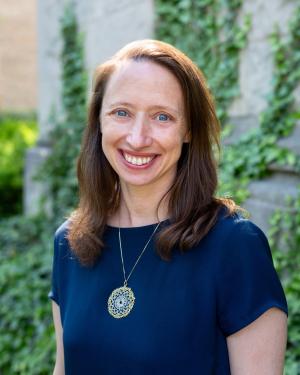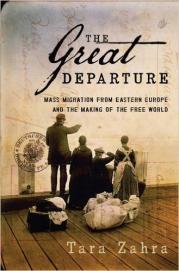
University of Michigan, PhD '05
BIOGRAPHY
Tara Zahra's research focuses on the history of modern central Europe from a global and transnational perspective. She has explored themes such as migration; the family; nationalism and internationalism; globalization; and, more recently, the history of dance. Her current project explores the intersections of dance and history through movement, research, and writing, in collaboration with dancer Meredith Dincolo. Zahra has been the recipient of a Guggenheim Fellowship (2021-22) and a Macarthur Fellowship (2014-2019) and is a member of the American Academy of Arts and Sciences. In 2025-26 she is on research leave as a visiting fellow at the Center for Ballet and the Arts (NYU).
Zahra’s most recent book, co-authored with Pieter M. Judson, is The Great War and the Transformation of Habsburg Central Europe (Oxford, 2026). Her previous work, Against the World: Anti-Globalism and Mass Politics Between the World Wars was published by W.W. Norton in 2023, and has been translated into German, Italian, Japanese, and Chinese. Earlier publications include The Great Departure: Mass Migration and the Making of the Free World (Norton, 2016); with Leora Auslander, Objects of War: The Material Culture of Conflict and Displacement (Cornell, 2018); The Lost Children: Reconstructing Europe's Families after World War II (Harvard, 2011) and Kidnapped Souls: National Indifference and the Battle for Children in the Bohemian Lands (Cornell, 2008).
Graduate Advising
I welcome applications from graduate students interested in Central European history (including Habsburg, East European, and German history) in the nineteenth and twentieth centuries, as well as international history/European history from a global perspective. I would also be interested in supervising students in the field of Dance History. Some of my current and former PhD students have worked on the history of gender and sexuality in late Imperial Vienna; migration and the family in postwar West Germany; the body in late Socialist Czechoslovakia; Jewish culture in postwar Czechoslovakia and Poland, Roma in postwar Hungary; colonialism and empire in Poland and Germany; and masculinity and coal mining in Socialist Czechoslovakia.
Recent Course Offerings
Undergraduate
- Dance as History (co-taught with Meredith Dincolo)
- Moving and Thinking/Thinking and Moving (core class, co-taught with Meredith Dincolo)
- East central Europe in the Twentieth Century
- Writing Family History (junior colloquium)
- Human Rights in World Civilization
- Twentieth-Century Europe
- History of Human Rights (in Vienna)
- Nazism (junior colloquium)
- European Civilization I & II
- Gender & Sexuality in World Civilization
- Migration and Displacement in Twentieth-Century Europe
Graduate
- History and Anthropology of the Present (with Susan Gal)
- Globalization and Its Discontents (with Jon Levy)
- The Departmental Seminar (with Jon Levy)
- Transnational Europe: Twentieth Century
- Nations & Empires (with Susan Gal)
- Nationalism in East Central Europe
- Unsettled Europe: Migration and Displacement in Modern Europe
- Gender and Sexuality in Modern Europe (with Leora Auslander)
- Historiography (with Emily Osborn)
- Migration and Material Culture in Modern Europe (with Leora Auslander)
University and Departmental Service
- Roman Family Director, Neubauer Collegium for Culture and Society
- Faculty Sponsor of Transnational Approaches to Modern Europe Workshop
- Executive Board, Center for Russian, East European, and Eurasian Studies
- Faculty Affiliate, Center for Study of Gender and Sexuality
- Editorial Board, Past & Present
Recent Research / Recent Publications
Against the World: Anti-Globalism and Mass Politics Between the World Wars. New York: W.W. Norton, 2023.
Coauthored with Pieter Judson, The Great War and the Transformation of Habsburg Central Europe. Oxford & New York: Oxford University Press, in progress.
Coauthored with Leora Auslander. Objects of War: The Material Culture of Conflict and Displacement. Ithaca, NY: Cornell University Press, 2018.
The Great Departure: Mass Migration from Eastern Europe and the Making of the Free World. New York: W.W. Norton, 2016.
- Review by Benjamin Cunningham in the Los Angeles Review of Books (May 24, 2016)
- Review by The Economist (April 30, 2016)
- Interview with Adam Morgan for the Chicago Review of Books (April 7, 2016)
- Review by Julie M. Klein in the Chicago Tribune (March 17, 2016)
The Lost Children: Reconstructing Europe's Families after World War II. Cambridge, MA: Harvard University Press, 2011.
- George Louis Beer Prize, American Historical Association, 2012
- Radomir Luza Prize, Austrian Cultural Forum, 2012
Kidnapped Souls: National Indifference and the Battle for Children in the Bohemian Lands, 1900–1948. Ithaca, NY: Cornell University Press, 2008; paperback, 2011.
- Book Prize, Czechoslovak Studies Association, 2009
- Barbara Jelavich Book Prize, American Association for the Advancement of Slavic Studies, 2009
- Hans Rosenberg Book Prize, Conference Group for Central European History, 2009.
- Book Prize, Austrian Cultural Forum, 2008-2009
- Laura Shannon Prize, Nanovic Institute, 2008–2009
- “Migration, Mobility, and the Making of a Global Europe,” Contemporary European History 31 (February 2022), 142-54.
- “Against the World: The Collapse of Empire and the Deglobalization of Interwar Austria,” Austrian History Yearbook 52 (2021)
- “Fin d’empire et genre de la déglobalisation,” Clio. Femmes, genre, histoire 53, 2021.
- "'Condemned to Rootlessness and Unable to Budge': Roma, Migration Panics, and Internment in the Habsburg Empire." American Historical Review 122, no. 3 (Jun. 2017).
- "Europe's Shifting Borders." Foreign Affairs (Feb. 11, 2017).
- "Travel Agents on Trial: Policing Mobility in Late Imperial Austria." Past & Present 223 (May 2014): 161–93.
- "Forum: Habsburg History." German History 31 (Jun. 2013): 225–38.
- With Pieter M. Judson. "Introduction." Austrian History Yearbook 43 (2012): 21–27.
- [Papers from the May 2008 symposium, "Indiference to Nation in Habsburg Central Europe."]
- "Going West." East European Politics and Societies 25 (Nov. 2011): 785–91.
- "'The Psychological Marshall Plan': Displacement, Gender, and Human Rights after World War II." Central European History 44 (Mar. 2011): 37–62.
- "Enfants et purification ethnique dans la Tchécoslovaquie d'après-guerre." Annales. Histoire, Sciences Sociales 66 (Apr.–Jun. 2011).
- "'A Human Treasure': Europe's Displaced Children Between Nationalism and Internationalism." Postwar Reconstruction in Europe: International Perspectives 1945–1949 Past & Present Supplement 6 (2011): 210.
- "Imagined Non-Communities: National Indifference as a Category of Analysis." Slavic Review 69 (Spr. 2010): 93–119.
- "'Prisoners of the Postwar': Expellees, Refugees, and Jews in Postwar Austria." Austrian History Yearbook 41 (2010): 191–215.
- "Lost Children: Displacement, Family, and Nation in Postwar Europe." Journal of Modern History 81 (Mar. 2009), 45–86.
- "The Minority Problem: National Classification in the French and Czechoslovak Borderlands." Contemporary European History 17 (May 2008): 137–165.
- "'Each Nation Only Cares for Its Own': Empire, Nation, and Child Welfare Activism in the Bohemian Lands, 1900–1918." American Historical Review 111 (Dec. 2006): 1378–1402.
- "Looking East: East Central European 'Borderlands' in German History and Historiography." History Compass 3, no. 1 (2005): 1–23.
- "Reclaiming Children for the Nation: Germanization, National Ascription, and Democracy in the Bohemian Lands, 1900–1945." Central European History 37 (Dec. 2004): 499–541.
- Writes an opinion piece "Globalization Is Collapsing. Brace Yourselves" for the New York Times (2025)
- Reviews of Against the World: Anti-Globalism and Mass Politics Between the World Wars in The New York Times and The Wall Street Journal.
- Receives Guggenheim Fellowship (2021)
- Delivers the Center for Austrian Studies' 36th Annual Kann Memorial Lecture (2020)
- "The Ugly U.S. History of Separating Famiies Goes Back Way Beyond Trump" in the Daily Beast
- Elected to the American Academy of Arts & Sciences
- Discusses "Europe's Shifting Borders" in Foreign Affairs
- Reviews of The Great Departure in the Chicago Tribune, the Economist, and the Los Angeles Review of Books
- Publishes The Great Departure: Mass Migration from Eastern Europe and the Making of the Free World (Norton, 2016)
- Writes an opinion piece, "America, the Not So Promised Land," for the New York Times
- Coorganizes "People & Things on the Move" conference, Neubauer Collegium
- Coorganizes "Human Trafficking, Labor Migration, and Migration Control in Comparative Historical Perspective" conference, Pozen Family Center for Human Rights
- Awarded 2014 MacArthur Fellowship
- Discusses "Humanitarianism and Displaced Children in Twentieth-Century Europe" [video, 66 minutes]
- Delivers lecture at Shannon Prize Award ceremony [video, 85 minutes]
- Writes on topics related to The Lost Children:Reconstructing Europe’s Families After World War II on The Nation
 THE UNIVERSITY OF CHICAGO
THE UNIVERSITY OF CHICAGO


